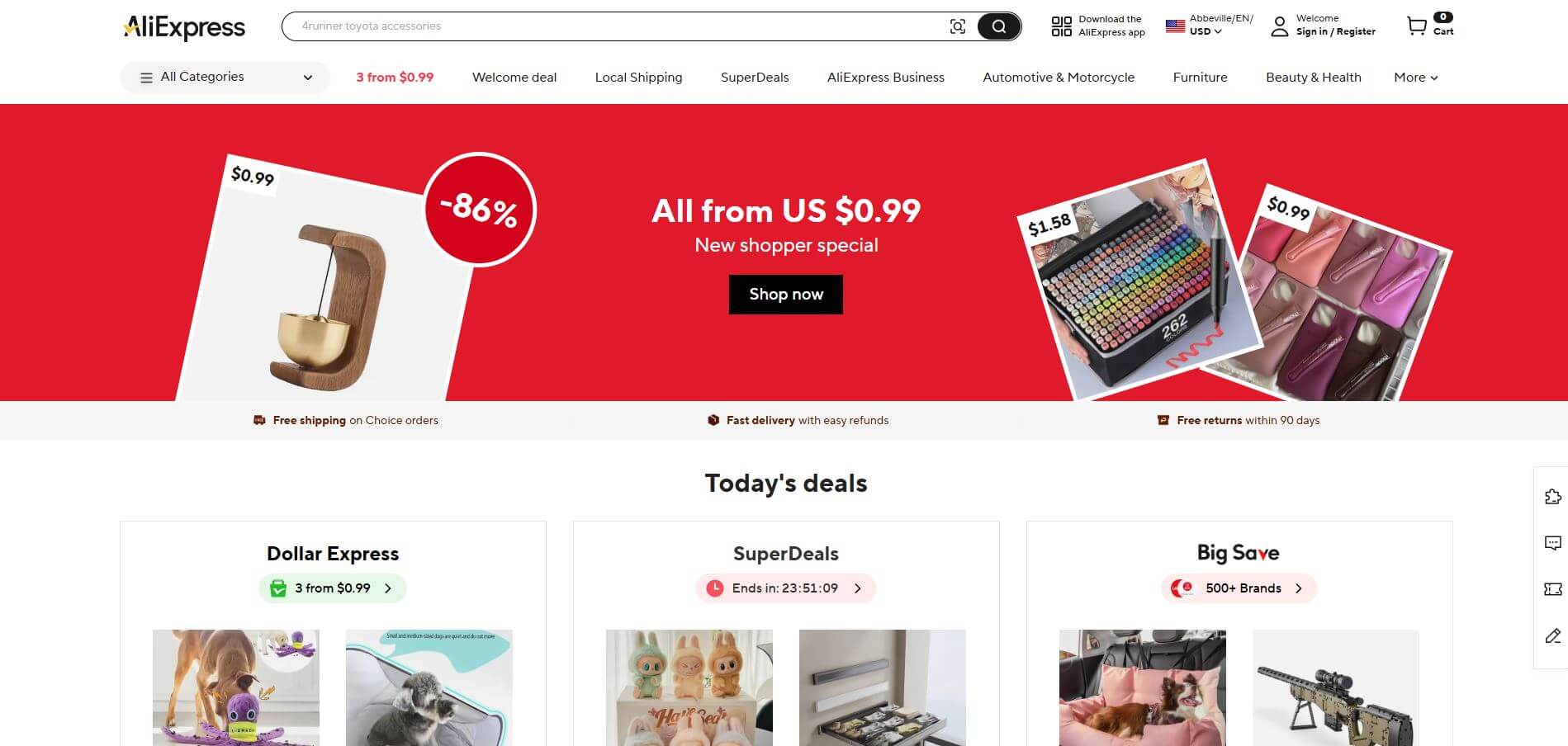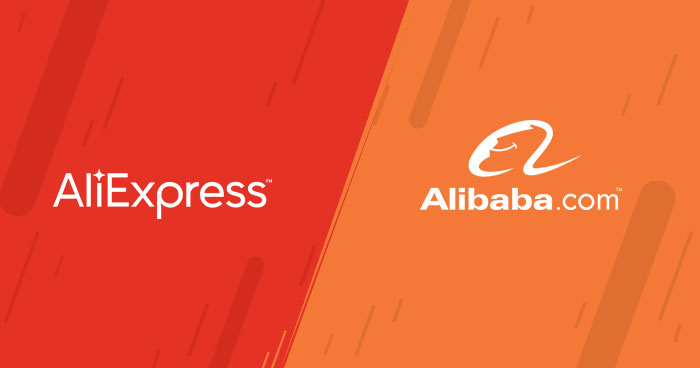If you’ve ever searched for affordable products to scale your business inventory or simply wanted to find reliable suppliers for your retail operation, you’ve probably come across Alibaba Vs AliExpress.
Both platforms dominate global trade, connecting millions of buyers and sellers worldwide. But despite their similarities, they cater to different types of buyers and business needs, making it essential to pick the right one based on your goals.
This detailed, unbiased comparison will explore everything you need to know—from pricing, shipping, and payment security to product quality and customer service. By the end, you’ll have a crystal-clear picture of which platform fits your needs best.
Let’s dive into the world of Alibaba wholesale advantages and AliExpress benefits to help you make an informed choice.
Understanding Alibaba and AliExpress: Platform Overviews
Alibaba: The Wholesale Marketplace

Alibaba is primarily designed for wholesalers, manufacturers, and bulk buyers engaging in B2B transactions. If you’re sourcing products in large quantities or looking to customize items with your brand labels, Alibaba offers a powerful network of suppliers to bring your visions to life.
One of Alibaba’s standout features is its focus on minimum order quantity (MOQ) policies, which typically require you to commit to bulk purchases—perfect if you have storage capacity and want to negotiate better prices.
Suppliers on Alibaba often provide product customization options to meet your exact specifications—from packaging to product features. Plus, the platform offers a supplier verification system, which vets manufacturers to help minimize fraud.
You also gain access to negotiation tools, allowing you to bargain for better rates and terms directly with sellers.
AliExpress: The Retail-Focused Platform

AliExpress caters to retail consumers, small businesses, and dropshipping entrepreneurs. Its structure suits buyers who want to place low-quantity or single-item orders with ease, without worrying about minimums.
Products are typically ready-made and available for immediate shipping, enabling you to quickly test new items or fulfill small customer orders.
AliExpress boasts a broad product variety, spanning electronics, fashion, home goods, and more—all accessible without bulk commitments. For dropshippers, AliExpress integrations with popular e-commerce tools make it simple to automate orders directly to customers, streamlining inventory management.
Overlapping Uses and Buyer Personas
While the distinction between Alibaba and AliExpress appears clear, the lines blur depending on your buying habits. For instance, some small buyers purchase from Alibaba in smaller lot sizes if suppliers permit, while savvy bulk buyers scour AliExpress deals when suppliers offer low MOQs or promotions.
- Bulk Importer: You want to source customizable goods in large quantities with volume discounts. Alibaba is your best fit.
- Dropshipper or Startup: You need no MOQ, quick shipping, and ready-made products to quickly launch your venture. AliExpress fits perfectly.
- Hybrid Buyer: You sometimes buy wholesale and sometimes retail, tapping both platforms depending on product availability and pricing.
Side-by-Side Comparison of Key Features
| Alibaba VS AliExpress: Comparison | Alibaba | AliExpress |
|---|---|---|
| Primary business model | B2B | B2C |
| Minimum quantity limits | Yes | No |
| Private Labeling | Yes | No |
| Average production time | 15 to 45 days | 7 to 45 days |
| Financing options | Available | No |
| Shipping costs | Shipping cost is usually negotiated between buyers and sellers | Usually free |
| Does the platform help with disputes | Alibaba helps with disputes | Aliexpress helps with disputes |
| Are the payment methods secure? | Yes | Yes |
| Can you negotiate prices with the seller? | Yes | No |
Pricing and Minimum Order Quantity (MOQ)
Alibaba generally requires higher MOQs per order, often starting at 100 units or more.
This helps reduce cost per item through volume discounts. This MOQ is flexible depending on the supplier, and some even accept smaller pilot orders, though prices might be higher. You’ll also gain negotiation leverage to lower prices or customize your order.
AliExpress, in contrast, offers single-unit purchases and extremely low MOQs—often just one item.
Pricing is fixed but competitive for smaller buyers or dropshippers who don’t want to hold inventory.
Example scenario:
A bulk importer might order 500 custom logo water bottles on Alibaba at $2 each, negotiating down from $3.
A dropshipper might order one bottle on AliExpress for $5, paying more per unit but avoiding inventory risk.
Shipping Times and Delivery Options
Alibaba shipments usually involve bulk freight with options like sea, air, or express shipping.
Delivery times are commonly 15–45 days depending on the method and destination, with higher costs associated with faster shipping.
Customs clearance, import duties, and taxes are important considerations.
AliExpress excels in shipping small parcels, often through ePacket or postal services.
Delivery typically takes 7–20 days. Expedited options may be available.
Shipping issues like delays or lost parcels are less common but still possible.
Payment Methods and Security
Alibaba supports multiple international payment methods, including trade assurance, wire transfers, and letters of credit.
Trade assurance protects payments if suppliers don’t meet order terms.
AliExpress uses secure payment methods like credit cards and PayPal (in some countries), with escrow to ensure sellers are paid only after order confirmation.
Product Quality and Supplier Verification
MOQ does not guarantee product quality. Vet suppliers carefully on Alibaba by checking certifications, trade assurance, and reviews. On AliExpress, focus on seller ratings, customer photos, and feedback.
Tips: Order samples first, ask for detailed info, and verify certifications or licenses.
Pros and Cons: Real-World Examples and Use Cases
Advantages of Alibaba
- Bulk pricing and volume discounts
- Product customization
- Wide supplier network
Example: A small brand successfully launched its own line of eco-friendly backpacks through Alibaba, customizing materials and branding.
Disadvantages of Alibaba
- Higher MOQ
- Complex negotiation process
- Longer, costlier shipping logistics
Advantages of AliExpress
- No MOQ
- Fast, affordable shipping
- Easy dropshipping integration
Example: A dropshipper scaled an online store selling trendy gadget accessories via AliExpress with no upfront inventory.
Disadvantages of AliExpress
- Limited customization
- Variable product quality
- Fixed pricing and less negotiation
User Experience and Platform Features
Website and Mobile App Interface
AliExpress offers a more intuitive interface with better search filters and customer reviews. Alibaba is tailored to B2B buyers, making it more complex but powerful for negotiations and RFQs.
Customer Service and Dispute Resolution
AliExpress typically resolves disputes faster via its escrow system. Alibaba disputes take longer due to larger transaction sizes and documentation requirements.
Integration With Dropshipping and E-commerce Tools
AliExpress integrates with Shopify, WooCommerce, and BigCommerce via tools like DSers and Oberlo. Alibaba focuses more on wholesale logistics and supply chain scale.
Regional Considerations and Accessibility
Shipping performance varies by country. US and EU buyers get smoother AliExpress shipping via ePacket.
Alibaba buyers should consider import rules, taxes, and freight complexity.
Environmental, Ethical, and Seller Perspectives (Bonus Insight)
Sustainability and Ethical Practices
Check for certifications and ask about eco-friendly packaging or labor practices. Alibaba lists verified manufacturers, while AliExpress offers less transparency on sustainability.
Seller Challenges and Opportunities
Alibaba sellers handle bulk logistics, branding, and factory production.
AliExpress sellers handle small orders and fast delivery. Success on either platform depends on communication and product quality.
Conclusion: Choosing Between Alibaba and AliExpress
Your choice depends on your business goals:
- Alibaba: Great for bulk buying, customization, private labels.
- AliExpress: Ideal for dropshipping, small quantity orders, faster testing.
Define your sourcing needs, test small orders, and explore both platforms with a free account.
Frequently Asked Questions (FAQs)
- Can I order small quantities on Alibaba?
Yes, many suppliers accept smaller sample or trial orders. Expect higher per-unit pricing for small quantities. - Is AliExpress safe for bulk purchases?
It’s better suited for small orders. For bulk, quality may vary. Use samples first and verify sellers. - How do shipping times compare?
Alibaba: 15–45 days (bulk freight). AliExpress: 7–20 days (parcel shipping). - Which platform is better for dropshipping?
AliExpress is better suited due to automation tools and low MOQs. - How can I verify suppliers?
Alibaba: badges, reviews, trade assurance. AliExpress: seller ratings, reviews, and buyer feedback. - Are there hidden customs fees?
Yes, especially on bulk orders. Check your country’s import policies to estimate taxes. - What are the safest payment methods?
Always use platform-protected payments (Trade Assurance, Escrow, PayPal). - Do both platforms offer buyer protection?
Yes. Alibaba: Trade Assurance. AliExpress: Escrow & Buyer Protection. Disputes are easier on AliExpress.
Ready to take the next step? Dive into Alibaba or AliExpress today with confidence and grow your business!


 Hot Articles
Hot Articles